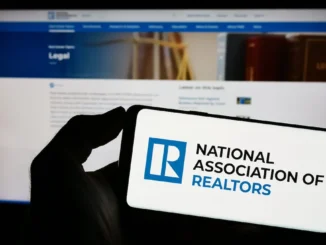
The National Association of Realtors (NAR) urged the U.S. Department of Veteran Affairs (VA) to revise its policies that ban veterans from paying broker commissions, an issue that is gaining attention following the NAR’s landmark $418 million settlement.
Earlier this month, the NAR announced the settlement of various lawsuits filed by home sellers, which allege that the real estate industry colluded to keep agent commissions artificially high at 5% to 6% of a home’s sale price.
With the settlement, NAR agreed to abolish its “Participation Rule” that required listing agents to make an offer of compensation to buyer brokers.
But the VA’s current policies place veterans at a “significant disadvantage” compared to other buyers, NAR President Kevin Sears said in a letter submitted Wednesday to John Bell, executive director of VA’s Loan Guaranty Service.
The VA rule states that a borrower using a VA loan cannot pay fees or commissions to a real estate agent unless determined “by the Under Secretary for Benefits as appropriate for inclusion … as proper local variances.”
The currency policy will put VA buyers on the sidelines, especially in a market with already tight inventory, Sears pointed out.
“In situations where no offer of compensation is offered from a seller, VA buyers are immediately at a disadvantage, potentially forcing them to forego professional representation, lose a property in an already limited inventory, choose a different loan product, or exit the market entirely,” Sears wrote.
The VA didn’t immediately respond to HousingWire’s request for comment.
NAR’s letter follows a similar message sent by the Community Home Lenders of America (CHLA) to the VA earlier this week.
In a letter submitted to Bell on Monday, the CHLA called on the VA to expedite regulatory change that would allow veterans and active-duty service members to fund buyer-broker commissions when purchasing a home with a VA mortgage.
An official from the VA previously told HousingWire that the department is working closely with the Department of Justice (DOJ) to determine any potential implications for veteran borrowers and is committed to ensuring that veterans are neither disadvantaged in the homebuying process nor overcharged.
“VA is actively engaged with the Department of Justice to review the potential implications and evaluate how VA can best ensure that VA’s home loan program remains an attractive option for Veterans in the homebuying process,” the official said on Monday.
Concerns over the existing VA policies have been echoed among mortgage professionals.
VA borrowers will be the hardest hit if they have to shoulder buyer-side commissions, said Jon Overfelt, director of sales and principal at American Security Mortgage Corp.
“VA loans are probably the best loans on the market. They’re 100% financing, they don’t require a downpayment and the guidelines are tilted toward helping the [borrower] get in the home,” Overfelt said.
“I would hope something would come of that because these people fought for our country, right? They’ve earned the right to have that VA loan,” he added.
If cooperative compensation is banned, the VA must weigh in to develop or accept a mechanism for VA borrowers and how to pay the buyer agent’s commission, said Ryan Grant, co-founder and division president of Neo Home Loans.



